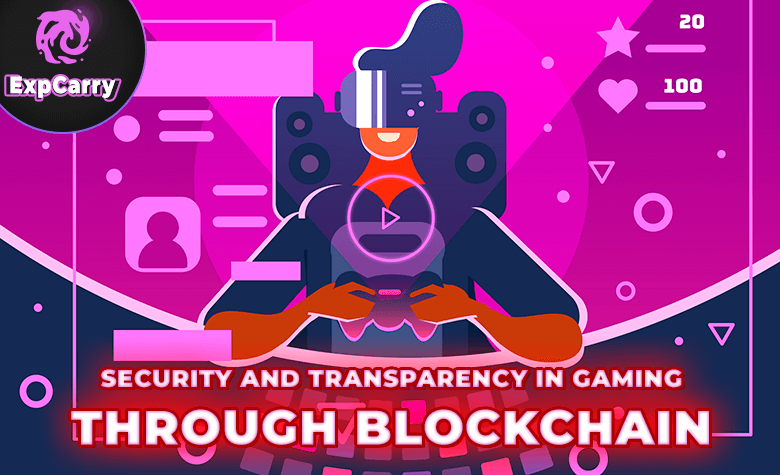Security and Transparency in Gaming Through Blockchain

With technological advancements, the gaming industry has witnessed exponential growth over the years, with millions of players engaging in online multiplayer games above World of Warcraft. However, such popularity came with a price. Security concerns, lack of transparency in transactions and questionable item ownership in games are just some of the many gaming-related challenges.
Blockchain technology emerges as a revolutionary solution, a savior offering enhanced security and transparency, ensuring a safer and more trustworthy gaming environment. In this article, we'll focus on the benefits blockchain technology brings to the gaming industry.
What are Blockchain Games?
Let's start from the basics and define what blockchain games are. In general, games based on blockchain technology are no different from traditional games. They use the same code to generate gaming environments and the same programming tools to execute gaming actions. However, there are some differences, which we'll cover in the following sections.
Player-Driven Economy
The first and the most obvious disparity between regular and blockchain games is that the latter offers a different in-game economy model. In other words, games built on blockchain offer players the possibility to earn real money by participating and contributing to the blockchain-based games' ecosystems.
Players can influence supply and demand dynamics by participating in in-game activities, contributing to a more dynamic and player-driven economy compared to traditional games where the developer has more centralized control.
Players can purchase in-game items and games' native tokens through trustless and secure crypto exchanges that support both crypto and transactions with payment cards. Conversely, players can earn games' native cryptocurrency and withdraw real money using the same exchanges.
An excellent example of such practice is the game Axie Infinity, which is something between Pokemon Go and Hearthstone. In this game, players earn in-game currency Smooth Love Potion (SLP) by logging in daily, completing daily tasks and winning PvP battles. More importantly, players can trade SLPs for real cryptocurrencies of their choice.
True Ownership of Assets
In blockchain-based games, players have true ownership of in-game assets, which is supported by smart contracts and self-automated codes built upon the Ethereum blockchain. These assets are represented as non-fungible tokens (NFTs) on the blockchain that provide verifiable and secure proof of ownership.
Implementing such a concept should prevent scenarios similar to the one from 2012 when countless players lost their in-game items due to security breaches in the Blizzards' Diablo III. Namely, the popular software company introduced the Real Money Auction House (RMAH), allowing players to buy and sell in-game items with real money.
Unfortunately, the RMAH was met with controversy and various issues, including fraud and security concerns, after many players reported instances of accounts being compromised and used for unauthorized transactions, causing players to lose valuable items or in-game currency.
Through their immutable and transparent nature, smart contracts address security concerns in gaming transactions. They automate ownership verification, execute transactions based on predefined conditions, and incorporate advanced security features.
By doing so, self-executed codes prevent fraud and provide a secure, decentralized solution to safeguard in-game assets, preventing incidents like the 2012 Diablo III breach.
Security Benefits
Blockchain's decentralized and distributed nature makes it highly resistant to hacking attempts. Centralized servers are susceptible to single points of failure, which is a known fact. In contrast, blockchain's security architecture minimizes the risk of unauthorized access and protects player accounts and their valuable in-game assets, making blockchain games resistant to hacking.
Also, blockchain uses cryptographic techniques to enhance players' data privacy. Players' personal information and transaction details are securely stored on the blockchain, which reduces the risk of data breaches and ensures their sensitive data remains confidential.
Blockchain could also find its use in resolving disputes between players and game developers. In case of disputes or discrepancies, both parties can refer to the transparent and unchangeable transaction history recorded on the blockchain, which is an immutable digitally recorded ledger by definition, providing a reliable source of truth.
Decentralized Marketplaces for Enhanced Transparency
Blockchain's transparency ensures that every transaction and ownership transfer is recorded on the blockchain. As a result, it minimizes fraud and enhances the security of in-game asset transactions, again preventing cases such as the Diablo III incident.
Furthermore, decentralized marketplaces are resistant to censorship. They provide players with greater control over purchased assets and in-game currencies. In traditional games, developers may restrict asset transfers or dictate how in-game economies function, limiting player freedom.
For example, in World of Tanks, a popular MMO game, developers hold the right to remove or replace purchased items. While players indeed receive compensation in other items or in-game currency, this centralized control contrasts with decentralized blockchain games, where true ownership is ensured, and assets cannot be arbitrarily altered or taken away by developers.
Conclusion
Undoubtedly, blockchain technology could have a revolutionary impact on the gaming industry. From true ownership of in-game assets through NFTs to the resilience against hacking, fraud prevention with smart contracts, and the transparency of decentralized marketplaces, blockchain ensures a safer, player-centric gaming environment.
Blockchain has what it takes to address historical issues related to the world of video gaming, offering a glimpse into the future of secure and transparent gaming ecosystems.
While we appreciate your interest in ExpCarry, we would like to emphasize that the use of gambling or cryptocurrency in connection with our brand is at your own risk. We do not endorse or promote such activities.